Captain Frederick Chalmers, an Indian Army officer who had been born in Nova Scotia in what is now Canada, returned to England in 1842 after serving as Superintendent of Mysore in India to take Holy Orders. He was accompanied by his young son whose mother had died when he was an infant. Lieutenant Frederick Chalmers, then the assistant to the Commissioner of Mysore, had married Eliza Smith, the daughter of the Reverend Smith, Chaplain of the Mysore establishment in May of 1834.
Frederick was ordained in 1843 and shortly afterwards married Matilda Marsh, a clergyman’s daughter and sister to Catharine Marsh, who was to become well known for her evangelical work amongst the poor of London, especially with the thousands of navvies building the railways in and around London, and also those working on the construction of the Crystal Palace for the Great Exhibition of 1851 in Hyde Park.
The Reverend Chalmers was given the living of Beckenham in 1851 and happily ministering there and acquiring a reputation for preaching a good sermon. In 1866 England’s fourth and final pandemic cholera epidemic erupted in the East-End of London and between the end of July and early November of that year nearly four thousand people died from the disease. Frederick’s sister-in-law worked among the poorest of those affected in the fever epidemic doing what she could to alleviate their suffering and as a result of promises made to dying parents that she would care for their children became the carer for over seventy orphans.
The Reverend Chalmers and his wife saw it as their duty to help these poor unfortunates and Mrs. Chalmers opened an orphanage for them in a large house in Beckenham, the accommodation was supplemented by the building a room made from iron in the garden. The orphaned children were brought up as much as possible on the family system with siblings being kept together and they were taught to help each other. They also received a good education at local church schools.
In the autumn of 1872 the Reverend Chalmers was appointed to the living of Nonington in Kent and when the Reverend, wife, and the remaining children moved there the orphanage’s iron house went with them, where according to a letter by Catherine Marsh, it was ” set up in the Vicarage Garden, to the delight of the orphans. It was sufficient for the small number of children now left in it”.
The Nonington vicarage where the Reverend Chalmers and his household were listed as living in the vicarage in the 1881 census is now “Hatchetts” at the top of Oak Hill (Vicarage Lane).
It would appear that the orphanage was is the out-buildings of the vicarage, as well as in the iron house in the garden, as in the 1881 census returns the Reverend Chalmers and his household are listed as living in the vicarage and there is a separate entry for the orphanage.
The Vicarage:
Frederick Chalmers, head, married , 76, Vicar of Nonington, Nova Scotia
Matilda Chalmers, wife, married, 70, Basildon, Berks
Dalzell Chalmers, son, single, 29, solicitor, Bromley
Catherine Marsh, sister-in-law, single, 61, Clergyman’s daughter, Colchester
Leila Ditmas, visitor, sngle, 23, daughter of major in army, Richmond, Surrey
Ann Collins, servant, single, 44, housekeeper & cook, Ireland
Elizabeth Tapsell, servant, single, 46, lady’s maid, West Wickham
Agnes Pannatt, visitor, single, 31, lady’s maid, Walmer
Johanna Herms, servant, single, 41, parlour maid, Germany
Lydia Horton, servant, single, 43, housemaid, Northbourne
Arthur Horne, servant, single, 27, butler, Ridgemount, Beds
The Reverend Chalmers must have been a man of some means judging by the number of servants at the Vicarage, and he also appears to pay the care of the orphans. Catherine Marsh, his sister-in-law, was a frequent visitor to the Nonington vicarage and was very well connected. She knew most of the leading reforming politicians of the day and was on good terms with Florence Nightingale.
The Orphanage:
Sarah Fagg, Head, 43, Matron
Emma D. W. Evans, boarder, 32, Elementary School Teacher
Emily Phillips, orphan, 23, general servant.
Orphans:
Mary A. Garland 13 London, Middlesex, England
Sidney Davies 14 Bromley, Kent, England
Letitia M. Potter 15 Beckenham, Kent, England
Emily Rudd 12 London, Middlesex, England
Annie Dennis 12 London, Middlesex, England
Louisa J. Clayson 10 Nonington, Kent, England
Richard Tapsell 9 Sundridge, Kent, England
Walter O. Scott 13 London, Middlesex, England
Edith C. Fagg, niece, orphan, 9, Yorkshire, Sheffield
Thomas C.H. Bailey 8 Beckenham, Kent, England
The orphanage appears to have closed when the Reverend Chalmers died on 15th July, 1885, while still incumbent at Nonington, and was succeeded by the Reverend Frederick Carus Wilson.
Below are the obituaries of the Reverend Chalmers and two of his sons.






Thanks for the input. Navigators: first got their name when digging the canal system in the 1700’s, later applied to the railway excavators, then to any general manual excavation workers. She did a lot for the navvies building the railways in the London area and also for the several thousand who were working on the Crystal Palace in Hyde Park for the Great Exhibition of 1851.Basically she spent her whole adult life helping the poor and successfully lobbying for a change in their living and working conditions.
Good story but I think that you left out a word:
Catharine Marsh, who was to become well KNOWN for her evangelical work amongst the poor of London
Also “a clergyman’s daughter and sister to Catharine Marsh, who was to become well for her evangelical work amongst the poor of London, especially with navvies.”
Navvies? I had never heard that before but it appears to be “Navvies were the men who actually built railways. ” and also labourers on other civil engineering works.